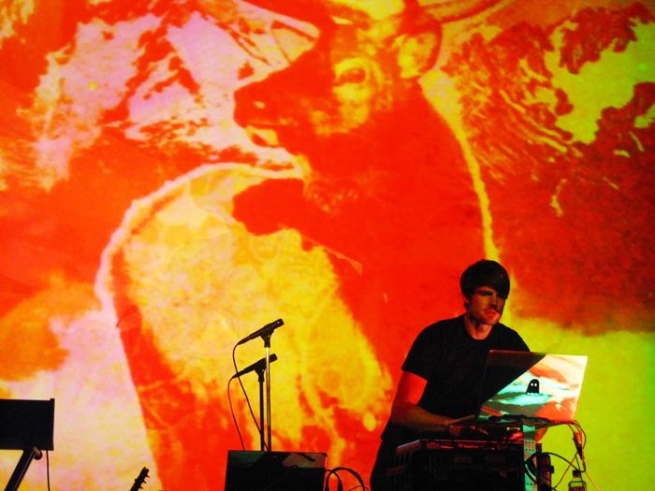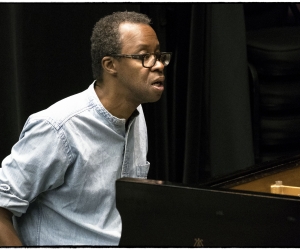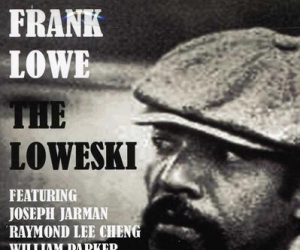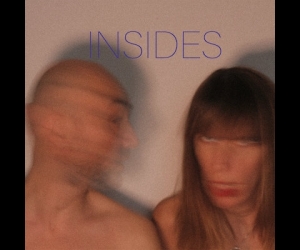
Decibel is an annual international electronic-music and visual-arts festival celebrating its sixth year, which it did by expanding its programming with stacked line-ups within genre-themed showcases, creating some scheduling conflicts and dilemmas of choice for audiences.
The opening gala took place in the Seattle Art Museum and featured artists from the Detroit-based label, Ghostly. In the theatre, The Sight Below delivered a warm, subtle, ambient set, full of moody percussion patterns delicately balanced with fuzzy black-and-white film renderings. The music and visuals together created a memorable performance. San Francisco artist Tycho, a.k.a. Scott Hansen, a.k.a. ISO50 for his image-design work, delivered a marvellous, nostalgic, sun-warped set, and shared the stage with Dusty Brown for some new renditions. His visuals, saturated with sentimental glimpses of nostalgic dreamscape imagery, proved to be one of the many performance highlights of this year’s festival. In the main entrance hall of the museum, Lusine started the dance party with fresh releases from his new album, A Certain Distance. His smooth house tracks and well-crafted minimal dance compositions made for a small, enthusiastic, dance-floor party.
Up on Capitol Hill—one of Seattle’s trendiest neighbourhoods—Echospace was rumoured to go on early at the Neumos venue, forcing attendees to choose between the opening of Echospace’s set or the end of Lusine’s superb set. Echospace delivered a set of beautiful, grooving, ambient dub, a fusion between dance-floor euphoria and deep immersion. Across the street at Sole Repair, Mikael Stravöstand played live on the balcony to a packed house below. His set was full of deep-glitchy pulses layered over driven beats.
The next highlight of the festival was the showcase, Optical 1: Immersion. Decibel’s Optical showcases highlight the pivotal role visual media plays in developing the genre of electronic music. Raster Noton pioneer Frank Bretschneider played the first set. The accompanying visuals of morphing, black-and-white spiralling shapes made for a striking performance, and he received the loudest applause of all the audiovisual theatre experiences. His mathematical deep-bass structures, crisp precise clicks, and dramatic frequencies become organic through pattern and melody. Christopher Willits followed, presenting a warm melodic set layered with live guitar patterns and tonal soundscapes. His set was performed against a backdrop of bright urban landscapes that focused on plant life emerging from cement cracks.
Friday night at the Dirty Dancing International Showcase in the Neumos venue, Detroit-based techno pioneer Rob Hood instantly pulled the audience into his trance-inducing minimalism, subtle rhythmic shifts, and restrained funky groove. Spain’s Alex Under was scheduled to go on next, but unfortunately, “due to unforeseen issues with Homeland Security,” was unable to make it. Frank Bretschneider went on instead and sadly couldn’t keep the crowd happy with his Raster Noton minimal rhythm aesthetics. Alex Under would have been a perfect fit, but throwing Frank Bretschneider into this showcase seemed unfair, especially after the audience witnessed Bretschneider’s prior success in the Optical theatre only a few hours earlier. Next up on the showcase, were the Wighnomy Brothers, Gabor Schablitzki and Sören Bodner. They formed their duo in 2001, and recently announced that this is their final year performing together, making their set of smart, late-night dance-floor tracks an historical one. Later the same night, at the after-hours venue Church of Bass, Seattle producer and German resident Bruno Pronsato stayed true to his unique voice within the minimal tech-house scene and delivered a dynamic, percussive, funk set full of swirling unexpected rhythmic patterns.
Despite the festival’s scheduling delays and set changes, all hiccups disappeared from our thoughts with the euphoric and flawless closing ceremonies at the Triple Door. A beautiful and historically preserved 1920s dinner theatre, the Triple Door created the perfect ambience for the evening’s opening set of warm and intimate solo piano compositions performed by Goldmund. Also known for his Helios moniker, Goldmund’s passionate modern classical arrangements, delicately restrained and incredibly moving, make for a magical experience. Next on the program, Benoit Pioulard (a.k.a. Thomas Meluch) sat on the floor of the stage and delivered some fuzzy, warm, psych-folk songs created with guitar, looping pedals, accordion, and microphones. Brooklyn’s Apestaartje label owners, Mountains (Koen Holtkamp and Brendon Anderegg) delivered an astonishing Americana modern-classical set with live guitar, electronic distortions and looping samples of found objects. The experience of their shimmering nuances and densely driven soundscapes left the audience buzzing.
And if the Triple Door concert wasn’t satisfying enough, it was time to surrender ourselves to Reagenz (Move D and Jonah Sharp) and Alter Ego at the Finale. Despite their hiatus since their first release in 1994, Reagenz proved, with their stunning live set, that they’re meant to be together. They skillfully delivered a deep, delicious, tech-house set full of seamless, funky, live bass lines, and deep ambient fluidity. The legendary Alter Ego (Roman Fluegel and Joern Elling Wuttke) closed the festival with an epic set full of bass-driven dance-floor stompers that had everyone dancing and smiling.
Overall, the festival was a great success, with many standout performances and experiences. Despite the few scheduling delays and hiccups, Decibel managed to successfully attract more people through their genre-themed showcases, making this year their best-attended festival to date.
Image: San Francisco artist Tycho, a.k.a. Scott Hansen played a memorable set at the Seattle Art Museum. Image by: Andrea Ayotte.


